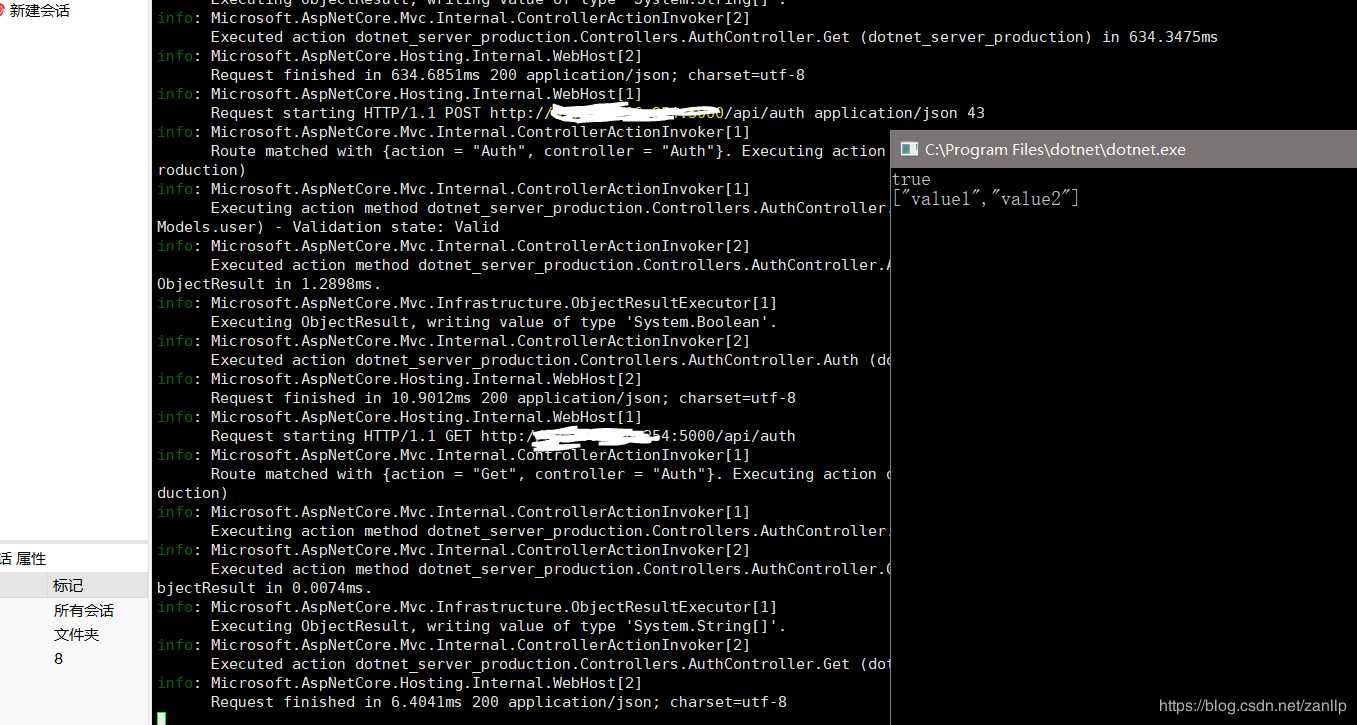标签:get use mysql ali convert console async follow core
微软文档地址https://docs.microsoft.com/zh-cn/dotnet/api/system.net.http.httpclient?view=netframework-4.7.2,只有get。post 的方法找了白天才解决
using System;
using System.Collections.Generic;
using System.Threading;
using System.Threading.Tasks;
using MySql.Data.MySqlClient;
using System.Timers;
using Newtonsoft.Json;
using System.Net.Http;
using System.IO;
using System.Net;
public class user
{
public string password;//密码hash
public string account;//账户
}
static async void TaskAsync()
{
using (var client = new HttpClient())
{
try
{
//序列化
user user = new user();
user.account = "zanllp";
user.password = "zanllp_pw";
var str = JsonConvert.SerializeObject(user);
HttpContent content =new StringContent(str);
content.Headers.ContentType = new System.Net.Http.Headers.MediaTypeHeaderValue("application/json");
HttpResponseMessage response = await client.PostAsync("http://255.255.255.254:5000/api/auth", content);//改成自己的
response.EnsureSuccessStatusCode();//用来抛异常的
string responseBody = await response.Content.ReadAsStringAsync();
Console.WriteLine(responseBody);
}
catch (Exception e)
{
Console.WriteLine("\nException Caught!");
Console.WriteLine("Message :{0} ", e.Message);
}
}
using (HttpClient client = new HttpClient())
{
try
{
HttpResponseMessage response = await client.GetAsync("http://255.255.255.254:5000/api/auth");
response.EnsureSuccessStatusCode();//用来抛异常的
string responseBody = await response.Content.ReadAsStringAsync();
Console.WriteLine(responseBody);
}
catch (HttpRequestException e)
{
Console.WriteLine("\nException Caught!");
Console.WriteLine("Message :{0} ", e.Message);
}
}
}
static void Main(string[] args)
{
TaskAsync();
Console.ReadKey();
}

在阿里云上的.Net Core on Linux
using ICSharpCode.SharpZipLib.GZip;
using Newtonsoft.Json;
using System;
using System.Collections.Generic;
using System.IO;
using System.Net;
using System.Net.Http;
using System.Net.Http.Headers;
using System.Threading.Tasks;
/// <summary>
/// 基于HttpClient封装的请求类
/// </summary>
public class HttpRequest
{
/// <summary>
/// 使用post方法异步请求
/// </summary>
/// <param name="url">目标链接</param>
/// <param name="json">发送的参数字符串,只能用json</param>
/// <returns>返回的字符串</returns>
public static async Task<string> PostAsyncJson(string url, string json)
{
HttpClient client = new HttpClient();
HttpContent content = new StringContent(json);
content.Headers.ContentType = new System.Net.Http.Headers.MediaTypeHeaderValue("application/json");
HttpResponseMessage response = await client.PostAsync(url, content);
response.EnsureSuccessStatusCode();
string responseBody = await response.Content.ReadAsStringAsync();
return responseBody;
}
/// <summary>
/// 使用post方法异步请求
/// </summary>
/// <param name="url">目标链接</param>
/// <param name="data">发送的参数字符串</param>
/// <returns>返回的字符串</returns>
public static async Task<string> PostAsync(string url, string data, Dictionary<string, string> header = null, bool Gzip = false)
{
HttpClient client = new HttpClient(new HttpClientHandler() { UseCookies = false });
HttpContent content = new StringContent(data);
if (header != null)
{
client.DefaultRequestHeaders.Clear();
foreach (var item in header)
{
client.DefaultRequestHeaders.Add(item.Key, item.Value);
}
}
HttpResponseMessage response = await client.PostAsync(url, content);
response.EnsureSuccessStatusCode();
string responseBody = "";
if (Gzip)
{
GZipInputStream inputStream = new GZipInputStream(await response.Content.ReadAsStreamAsync());
responseBody = new StreamReader(inputStream).ReadToEnd();
}
else
{
responseBody = await response.Content.ReadAsStringAsync();
}
return responseBody;
}
/// <summary>
/// 使用get方法异步请求
/// </summary>
/// <param name="url">目标链接</param>
/// <returns>返回的字符串</returns>
public static async Task<string> GetAsync(string url, Dictionary<string, string> header = null, bool Gzip = false)
{
HttpClient client = new HttpClient(new HttpClientHandler() { UseCookies = false });
if (header != null)
{
client.DefaultRequestHeaders.Clear();
foreach (var item in header)
{
client.DefaultRequestHeaders.Add(item.Key, item.Value);
}
}
HttpResponseMessage response = await client.GetAsync(url);
response.EnsureSuccessStatusCode();//用来抛异常的
string responseBody = "";
if (Gzip)
{
GZipInputStream inputStream = new GZipInputStream(await response.Content.ReadAsStreamAsync());
responseBody = new StreamReader(inputStream).ReadToEnd();
}
else
{
responseBody = await response.Content.ReadAsStringAsync();
}
return responseBody;
}
/// <summary>
/// 使用post返回异步请求直接返回对象
/// </summary>
/// <typeparam name="T">返回对象类型</typeparam>
/// <typeparam name="T2">请求对象类型</typeparam>
/// <param name="url">请求链接</param>
/// <param name="obj">请求对象数据</param>
/// <returns>请求返回的目标对象</returns>
public static async Task<T> PostObjectAsync<T, T2>(string url, T2 obj)
{
String json = JsonConvert.SerializeObject(obj);
string responseBody = await PostAsyncJson(url, json); //请求当前账户的信息
return JsonConvert.DeserializeObject<T>(responseBody);//把收到的字符串序列化
}
/// <summary>
/// 使用Get返回异步请求直接返回对象
/// </summary>
/// <typeparam name="T">请求对象类型</typeparam>
/// <param name="url">请求链接</param>
/// <returns>返回请求的对象</returns>
public static async Task<T> GetObjectAsync<T>(string url)
{
string responseBody = await GetAsync(url); //请求当前账户的信息
return JsonConvert.DeserializeObject<T>(responseBody);//把收到的字符串序列化
}
}
c# 使用HttpClient的post,get方法传输json
标签:get use mysql ali convert console async follow core
原文地址:https://www.cnblogs.com/guohu/p/12982850.html